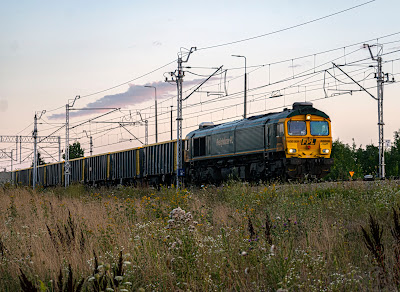Sunset is now noticeably earlier than in late June, well over an hour, and the weather, though still hot, is capricious. Government warnings in the form of SMSs advise citizens of possible "intensive rainfall and hail storms", and to protect property against localised flooding. And indeed, in the late afternoon, the heavens did indeed open - Hollywood style, a loud thunderclap portends the start of a downpour. Just enough time to bring the washing in! It rains hard, but not too long. As it eases, I hear the siren calling Chynów's volunteer fire service; more likely to be a flooded cellar than a house fire.
The dog days - that hot and humid part of summer - the least comfortable of the season. Historically, this was the period around the heliacal rising of the star system Sirius (the 'Dog Star'), which the Ancient Greeks associated with humid heat, sudden thunderstorms, lethargy, fever, mad dogs and bad luck. At Warsaw's latitude, Sirius will rise with the sun on 23 August, the height of the dog days - kanikuła in Polish, from the Latin caniculares (and Hundestage in German).
I set off for my walk just after 9pm, by which time it's entirely dark. Turning left at the end of my drive, I headed past the orchards and into the forest. I am so familiar with the forest that it holds no terrors for me. No cryptids with eyes glowing like red-hot coals. No black triangles, the size of four football fields, hovering silently overhead. No deranged killers on the run. Though I have a torch in my phone, I'm not using it; after a while, my eyes become accustomed to the darkness, and in any case, I know the paths through the forest well. I come to a clearing. Across a field of low scrub I can see the far horizon; distant flashes in the sky to the south-east tell of the thunderstorm that passed over Jakubowizna a few hours earlier.
After a while, I cross the road between Jakubowizna and Machcin, and disappear into another forest track that leads towards Dąbrowa Duża and Rososz. This part of the forest has not been logged, and as such is far denser, darker. Rich smells mingle - here and there, fermenting mirabelle plums, the earthy scent of forest floor with early mushrooms; wildflowers, unidentified.
The path takes me on. To my left, individual lights mark out distant houses on the fringes of Dąbrowa Duża. Here and there, barking dogs. I reach the new asphalt at the end of the village (below) and start walking through it. Photo taken with camera resting on a post, quarter of a second at f/2.8, 3200 ISO.
By now, it's gone 10pm, no one about on the street. Here and there I can smell barbecues and hear music - summer parties winding down. It's still very warm, 22C. In my rucksack I have a lightweight jacket in case of a shower or sudden fall in temperature - I don't need it. All is good. No gnats or midges to bother me either.
The sky remains clear. I can see the blinking lights of passenger jets heading south after taking off from Okęcie. I can see Ursa Major, the Plough, the two stars to the left of the constellation pointing north towards Polaris, the pole star. And indeed, I am walking due north, back towards Machcin II.
Below: with no light other than the night sky, the unasphalted road to Machcin II (incidentally, this is pronounced 'Machcin drugi' rather than 'Machcin dwa' by locals). Note the puddles left by this afternoon's rain. Two-and-half-second exposure, f/3.5, 2800 ISO. Adobe's AI-driven noise-reduction software (still in beta, I must add), is crap.
Reaching the road, I decide to return home the long way - turning left and through Jakubowizna. Below: long exposure punctuated by flash on the village's border.
By now, it's nearly 11pm, the last of the summer parties is ending, the village is entirely still. Just a few dogs here and there. Past the station, up the hill, round the corner, back down and home. A total of 13,500 paces walked in just over two hours.
This time last year:
Old soul, new challenge
This time two year ago:
What happened at Monks Wood
This time four years ago:
Loss, faith and consolation
This time six years ago:
Summer's wasting away
This time seven years ago:
Warsaw remembers the PASTa building capture
This time eight years ago:
Drought. It was a dry summer.
This time ten years ago:
Warsaw's ski slope at Szczęśliwice
This time 11 years ago:
On the road from Dobra, again
This time 12 years ago:
August storm, ul. Targowa
This time 13 years ago:
Warsaw Central's secret underground kebab factory
This time 14 years ago:
Cheap holidays in other people's misery
This time 15 years ago:
Steam welcomes us to Dobra
This time 16 years ago:
New houses appear in the fields by Zgorzała









































